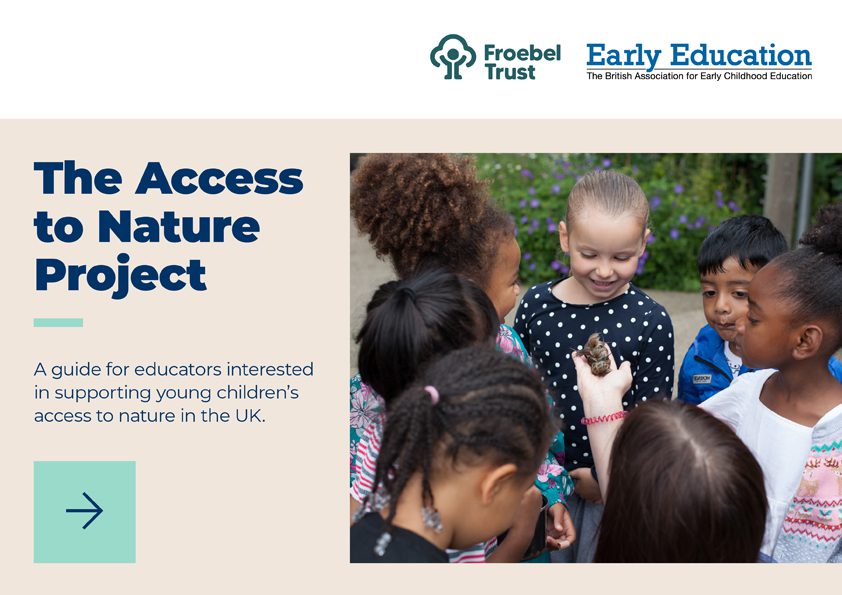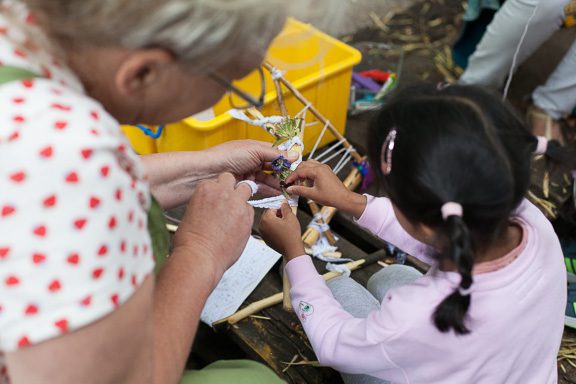The Froebel Trust and Early Education worked together on this collaborative project to explore and understand young children's access to natural environments in the UK.
The Access to Nature project included a literature review (Part one). This was followed by a research project (Part two) which gathered the views and outdoor experiences of young children, their parents, carers and their early years educators in the UK.
Using key findings from this research, a guide was created for educators interested in supporting young children's access to nature. This is available as a free download on our website and from Early Education's website.

Children and nature
A collection of Froebel Trust funded research and free resources for educators all about children's relationships with nature
Find out moreThe research project - Part One
A Literature Review Exploring Young Children’s Access to Natural Environments in the UK - December 2021
by Dr Tansy Watts
Summary
This report draws on currently published literature to explore inequalities in babies’ and young children’s access to a natural environment.
A literature search has been conducted in seeking to understand which children have limited access compared with their peers, and the types of barriers influential to this.
The report highlights identified impacts from the Covid-19 pandemic and demonstrates influence from a loss of social infrastructure and its role in family life.
The report then shares solutions offered by early childhood education and care services (ECEC) in promoting access to a natural environment. Although there is limited awareness of social injustices to be addressed through such practices, early education can be seen as well-positioned to do so.
The report is framed by a Froebelian perspective and suggests that a reconnection of early years practice with an originating holistic logic may now offer valuable guidelines with relevance to current conditions.
Time availability is one of the most frequently cited reasons for not taking visits to a natural environment and it is highlighted that those on a low income can have long, anti-social working hours and wider responsibilities that can be impactful.
The research project - Part Two
Access to Nature Report - January 2022
by the Early Education Research Team - Dr Helen Bradford, Dr Helen Lewis, Fran Paffard and Leslie Patterson
Early Education is a charity and membership organisation for individuals and organisations working in early childhood education across the UK.
Download a copy of the Executive Summary
Summary
The purpose of this research project led by the Early Education Research Team was to explore data across real-life early years environments to help to explain the complexities of children’s outdoor experiences from birth; in other words, their access to nature.
Data collection methods used in this research:
- Parent questionnaires and focus groups
- Practitioner questionnaires and focus groups
- Small group activity with individual participant children
Four research questions framed the data collection for the study:
How should access to nature be defined?
This first research question aimed to include the perceptions of all stakeholders involved:
a. Children’s perceptions
b. Parents’ perceptions
c. Early years educator perceptions
Is young families’ access to nature similar for all?
The research team looked at what resources were available to families.
Is young families’ access to nature being enabled both at home and in the early years setting?
The research team wanted to understand what factors enabled young families’ access to nature, and also what constituted effective early years practice.
Has Covid had an impact on children and their engagement with the outdoor environment?
The research team investigated young families’ and setting experiences of the ongoing pandemic and any ensuing impact on attitudes to being outdoors, either positive or negative.

Six key findings emerged from the data:
- Access to nature was clearly defined according to the individual perceptions of each of the three stakeholder groups involved in the project; the participant children, the parents, and the early years educators. Definitions of access to nature shaped adult responses as to what were perceived as outdoor experiences available to young families.
- Access to nature was not similar for all young families.
- Young families’ access to nature was, where possible, being enabled both at home and in the early years setting. This included during the lockdown periods of the pandemic.
- Barriers to access to nature emerged for both parents and early years educators.
- Differing opinions across the adult data sets emerged in relation to the impact of Covid-19.
- Two effective pedagogical strategies used across settings to support children’s and family engagement with outdoor spaces emerged. These were the importance of being a role model, and signposting in various ways to help parents gain ease of access to outdoor places and spaces.
"...there are patterns to children’s outdoor experiences, and that children are engaging, and indeed, need to engage, with outdoor environments as a natural part of growing up, from birth onwards..."

